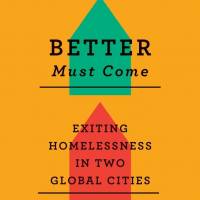This longitudinal ethnographic study by Matthew D. Marr examines the problem of homelessness in Tokyo and Los Angeles. Special focus is given to the structural conditions that facilitate or impede getting off the streets.
Better Must Come, by Matthew D. Marr
240 pages
Cornell University press, Nonfiction.
Marr identifies the major differences between welfare systems, housing policies and support programs in both cities, and captures the relevant soft factors, such as prevailing attitudes toward receiving welfare benefits, which people in Japan much more reluctantly applied for than those in the U.S.
One of most interesting parts of the book is where Marr looks at the role of family ties. In contrast to Los Angeles, where many of his interviewees remained in touch with their families during periods of homelessness, most of the participants in Tokyo reported that they had severed all contacts with their family. Marr is careful not to reduce this tendency to the commonplace "culture of shame" argument, but clearly contextualizes it within the different "welfare regimes" of the two cities, and the two societies' differing gender and generational expectations.
What drives the book along are the many first-hand stories from Marr's interviews with people whom he followed through and occasionally out of longer periods of homelessness. These experiences are skillfully interwoven with the general argument of the book, and serve to bring home both the main similarities and differences of living on the streets in L.A. and Tokyo.
The book closes with an unambiguous dismissal of neoliberal solutions to homelessness, and a call for more generous and more effective government support.



















With your current subscription plan you can comment on stories. However, before writing your first comment, please create a display name in the Profile section of your subscriber account page.